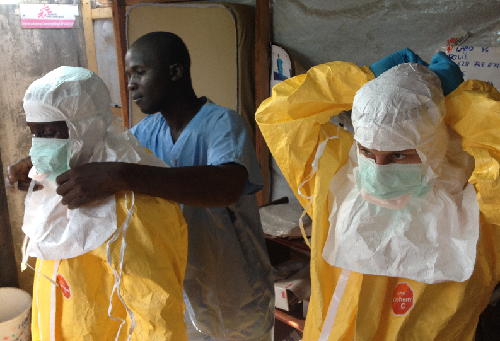The West African Health Organisation (WAHO) says there is urgent need for countries to prepare for emergencies to prevent economic, human and other losses, especially as the region lost 7 billion dollars in terms of cost during the 2014 Ebola epidemic.
Stanley Okolo, the Director-General of the organisation, disclosed this to the News Agency of Nigeria (NAN) during the Regional Disease Surveillance Systems Enhancement (REDISSE) sub-committee meeting in Lagos on Friday.
REDISSE project is a regional project funded by the World Bank, covering all the 15 ECOWAS countries and Mauritania in five-year phases from 2016 to 2023.

The first phase covers three countries, including Guinea, Senegal and Sierra Leone, the second phase covers four countries of Nigeria, Guinea-Bissau, Liberia and Togo.
Its implementation is in the third phase, covering four countries – Benin, Mali, Niger and Mauritania.
Mr Okolo said, “I am challenging the 15 countries in West Africa to be ahead of the curve because those involved in epidemic and emergencies know it has huge economic problems.
“We were involved in the 2014 Ebola epidemic and had nearly 7 billion dollars in terms of lost productivity, lost income, lost tourism and aid that came.
“This nearly 7 billion dollars is probably only in cost; we are not talking of the nearly 12,000 brothers, sisters, children and women that died, we must not have that again,’’ he said.
“So, a lot of work is going on but what I am really charging us to do is get ahead and challenge each other; and also to our leaders, that they imbibe and acquire the models and tools so as to be prepared and fight diseases.
“Our responsibility in our region is to make sure that countries are brought together, challenge them, give them support and promote the right things that will give us that epidemic preparedness.’’
Mr Okolo, a professor, added that: “It is important to say that the first 48 hours in outbreak of any epidemic is critical and what is done then is dependent on how prepared you are within that 48 hours.
“Epidemic responsibility is dependent on the easiness of preparedness and the system in each country; in other words, the preparedness in response depends on preparedness of each and every country.
“So, we are looking at how our countries, individually, are setting up their system, their people in terms of surveillance in getting information from all the districts, all the public health communities and how they are analysing those information.
“Also, how they have set up laboratories that will support the surveillance so that we can do the test to know when to suspect an illness.’’
The director-general said that the structure of REDISSE is important because “through it, the World Bank gives loan at zero or very low interest.
“It is trying to support our region so we don’t have the problem we had in 2014, for us to be prepared.
“Therefore, it is an opportunity for our region to get that preparedness in place’’. On the measures that have been put in place to checkmate future epidemic outbreaks in the region, Mr Okolo said: “The global community, physicians and everybody have learned the lessons from 2014.
“That is why in a lot of these projects, governments like that of Germany, are supporting us in terms of preparedness and finances.
“Also, in the region, we have set up super regional laboratories; 12 of them in West Africa for human reference analysis and another two is for veterinary.
“We have veterinary because we are looking at it that sometimes too some of these diseases and epidemics come through animals.
“We are also looking at how to train people, epidemiologists, to support the countries; we have 3,000 to support across West Africa.
“These are part of the things we are talking about in boosting capacity in terms of human resources.’’
Mr Okolo underscored the need to improve on the lessons learnt from the 2014 Ebola epidemic, including poor disease surveillance infrastructure as well as poor information sharing and collaboration.
According to him, poor emergency response, inadequate financing and leadership are also take outs to be learnt from the 2014 Ebola epidemic in the sub-region.
Also, John Paul Clark of the World Bank said: “This is our opportunity to discuss the challenges we face openly.
“From this meeting, we will map out strategies to utilise the resources that will help WAHO.
“We also seek to provide the technical support and assistance in more timely manner that will help the bank overcome some of the bureaucratic obstacles presently being encountered as well as streamline the procedures.’’
(NAN)












generic pills for sale: https://genericwdp.com/ meds online without doctor prescription
generic tadalafil united states: http://tadalafilonline20.com/ tadalafil max dose